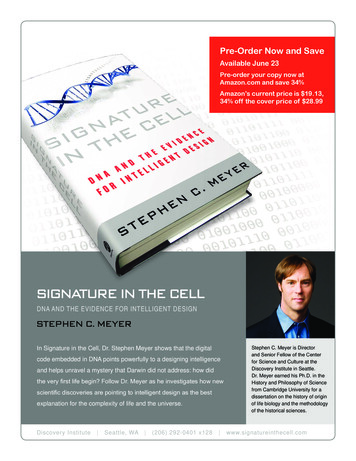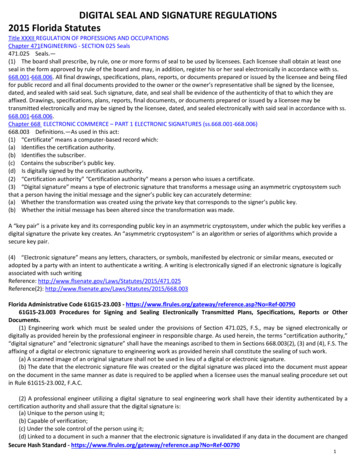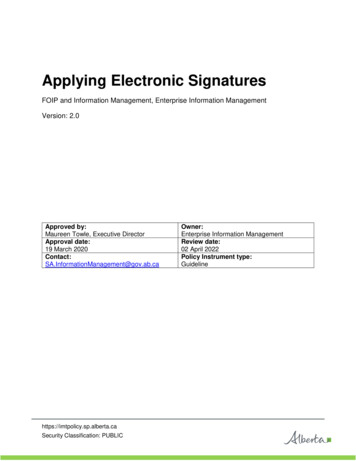
Transcription
Pre-Order Now and SaveAvailable June 23Pre-order your copy now atAmazon.com and save 34%Amazon’s current price is 19.13,34% off the cover price of 28.99SIGNATURE IN THE CELLDNA AND THE EVIDENCE FOR INTELLIGENT DESIGNSTEPHEN C. MEYERIn Signature in the Cell, Dr. Stephen Meyer shows that the digitalcode embedded in DNA points powerfully to a designing intelligenceand helps unravel a mystery that Darwin did not address: how didthe very first life begin? Follow Dr. Meyer as he investigates how newscientific discoveries are pointing to intelligent design as the bestexplanation for the complexity of life and the universe.Discovery Institute Seattle, WA (206) 292-0401 x128 Stephen C. Meyer is Directorand Senior Fellow of the Centerfor Science and Culture at theDiscovery Institute in Seattle.Dr. Meyer earned his Ph.D. in theHistory and Philosophy of Sciencefrom Cambridge University for adissertation on the history of originof life biology and the methodologyof the historical sciences.www.signatureinthecell.com
advance praise for SIGNATURE IN THE CELLHow does an intelligent person become a proponent of intelligent design? Anyone who stereotypes IDers as antiscientificideologues or fundamentalists should read Dr. Meyer’s compelling intellectual memoir. Meyer as a student becamefascinated with the “DNA enigma”—how the information to produce life originated—and at considerable risk to hiscareer hasn’t given up trying to solve the mystery. Meyer shows how step-by-step he concluded that intelligent designis the most likely explanation of how the DNA code came to be, but he’s open to new evidence—and in so doing hechallenges defenders of undirected evolution to have the courage to explore new alternatives as well.— Dr. Marvin Olasky, provost, The King’s College, New York City, and editor-in-chief, WorldIn this engaging narrative, Stephen Meyer demonstrates what I as a chemist have long suspected: undirected chemicalprocesses cannot produce the exquisite complexity of the living cell. Meyer also shows something else: there iscompelling positive evidence for intelligent design in the digital code stored in the cell’s DNA. A decisive case basedupon breathtaking and cutting-edge science.— Dr. Philip S. Skell, National Academy of Sciences and Evan Pugh Professor at Pennsylvania State University,emeritusIn Signature in the Cell, Stephen C. Meyer gives us a fascinating exploration of the case for intelligent design theory,woven skillfully around a compelling account of Meyer’s own journey. Along the way, Meyer effectively dispels themost pernicious caricatures: that intelligent design is simply warmed-over creationism, the province of deluded foolsand morons, or a dangerous political conspiracy. Whether you believe intelligent design is true or false, Signature in theCell is a must-read book.— Dr. Scott Turner, Environmental and Forest Biology, State University of New York, and author ofThe Tinkerer’s Accomplice: How Design Emerges from Life ItselfMeyer demolishes the materialist superstition at the core of evolutionary biology by exposing its Achilles’ heel: itsutter blindness to the origins of information. With the recognition that cells function as fast as supercomputers and asfruitfully as so many factories, the case for a mindless cosmos collapses. His refutation of Richard Dawkins will haveall the dogs barking and angels singing.— George Gilder, author of Wealth and Poverty and TelecosmThis is a “must read” for all serious students of the origin-of-life debate. Not only is it a comprehensive defenseof the theory of intelligent design, it is a lucid and rigorous exposition of the various dimensions of the scientificmethod. Students of chemistry and biology at all levels—high school, undergraduate, or postgraduate—will find muchto challenge their thinking in this book.—Alastair Noble, Ph.D. chemistry, former BBC Education Officer and Her Majesty’sInspector of Schools for Science, ScotlandThe origin of life remains one of the great unsolved mysteries of modern science. Looking beyond the biochemistryof the problem and focusing instead on the origin and information content of the “code of life,” Meyer has writtenan eminently readable and engaging account of the quest to solve this mystery. Sharing both his personal historyand a retelling of the key scientific discoveries of the last half century from this new and intriguing perspective, hehas challenged us to consider an alternative to the standard story of abiogenesis and discover new meaning from ourexistence. I recommend this book to laypeople and accomplished professionals alike.— Edward Peltzer, Ph.D., Ocean Chemistry, Scripps Institution of Oceanographywww.stephencmeyer.com
Signature in the Cell is at once a philosophical history of how information has come to be central to cutting-edgeresearch in biology today and one man’s intellectual journey to the conclusion that intelligent design provides thebest explanation for that fact. In his own modest and accessible way, Meyer has provided no less than a blueprint fortwenty-first-century biological science—one that decisively shifts the discipline’s center of gravity from nineteenthcentury Darwinian preoccupations with fossils and field studies to the computerized, lab-based molecular geneticsthat underwrites the increasingly technological turn in the life sciences. After this book, readers will wonder whetheranything more than sentimentality lies behind the continued association of Darwin’s name with “modern biology.”— Dr. Steve Fuller, Professor of Sociology of Science, University of Warwick,and author of Dissent from DescentThe astonishing complexities of DNA have raised questions which the ruling scientific orthodoxy cannot begin toanswer. As one of the scientists arguing for ‘intelligent design’ as the crucial missing link in our understanding of howlife came to be, Stephen Meyer guides us lucidly through that labyrinth of questions opened by discoveries in molecularbiology on the frontier of scientific knowledge.—Christopher Booker, The Sunday TelegraphThe most substantial of the many outstanding enigmas in our understanding of biology is to explain the source ofthe genetic information strung out along the Double Helix and how it gives rise to the near infinite diversity of formand attribute of the living world. Dr Meyer’s evaluation of the many contending theories in the light of the mostrecent scientific advances is comprehensive and dispassionate. While his interpretation of the arguments in favour ofIntelligent Design may not persuade all, this is a fascinating and intellectually stimulating book.—Dr. James Le Fanu, author of Why Us? How Science Rediscovered the Mystery of OurselvesStephen Meyer shows with brilliant clarity that biological systems contain information whose origin cannot beexplained by purely physical forces. He explains the crucial difference between the order within a complex systemand the information needed to specify the functions of a complex system. Many engineers have always known thathierarchical systems do not evolve from the bottom-up by chance. Now Meyer has explained why hierarchicalbiological systems cannot evolve from the bottom-up by chance mutations.—Dr. Stuart Burgess, Professor of Design & Nature, Dept of Mechanical Engineering, Bristol UniversityThis timely and important book is a landmark in the intelligent design debate and one which draws together allrelevant research and information. It is elegantly written in a style that is accessible and laced with interestinghistorical and personal anecdotes. Signature in the Cell will pay rich dividends to everyone who turns its pages.—Dr. Norman C. Nevin, OBE, BSc, MD, FFPH, FRCPath, FRCP (Edin), FRCPEmeritus Professor in Medical Genetics, Queen’s University, BelfastSignature in the Cell delivers a superb overview of the surprising and exciting developments that led to our modernunderstanding of DNA, and its role in cells. Meyer tells the story in a most engaging way. He retained my interestthrough many areas that would normally have turned me off. He is careful to credit new ideas and discoveries to theiroriginators, even when he disagrees with the uses to which they have been put. The central idea of the book is thatthe best explanation of the information coded in DNA is that it resulted from intelligent design. Meyer has marshaleda formidable array of evidence from fields as diverse as biochemistry, philosophy and information theory. He dealsfairly and thoroughly with even the most controversial aspects and has made a compelling case for his conclusion.The book is a delightful read which will bring enlightenment and enjoyment to every open minded reader.—Dr. John C. Walton, School of Chemistry, University of St. AndrewsDr. Stephen Meyer has “hit one out of the ballpark” in the debate over intelligent design. His incisive and diligentwork will certainly take its place as a major milestone in the quest for the truth about our origins. His engagingtalent, insights, and commitment has produced a most readable and disturbingly provocative essential for any seriousthinking inquirer.—Chuck Missler, Founder, Koinonia Institutewww.stephencmeyer.com
SIGNATURE IN THE CELLDNA AND THE EVIDENCEFOR INTELLIGENT DESIGNby STEPHEN C. MEYER(HarperOne Books, 2009)In stores everywhereJune 23rdThe foundations of scientific materialism are inthe process of crumbling. In Signature in theCell, philosopher of science Stephen C. Meyer shows howthe digital code in DNA points powerfully to a designingintelligence behind the origin of life. The book will bepublished on June 23 by HarperOne.Unlike previous arguments for intelligent design,Signature in the Cell presents a radical and comprehensivenew case, revealing the evidence not merely of individualfeatures of biological complexity but rather of afundamental constituent of the universe: information. Thatevidence has been mounting exponentially in recent years,known to scientists in specialized fields but largely hidden from public view. A Cambridge University-trainedtheorist and researcher, director of the Discovery Institute’s Center for Science and Culture, Dr. Meyer is thefirst to bring the relevant data together into a powerful demonstration of the intelligence that stands outsidenature and directs the path life has taken.The universe is comprised of matter, energy, and the information that gives order to matter and energy,thereby bringing life into being. In the cell, information is carried by DNA, which functions like a softwareprogram. The signature in the cell is that of the master programmer of life.In his theory of evolution, Charles Darwin never sought to unravel the mystery of where biologicalinformation comes from. For him, the origins of life remained shrouded in impenetrable obscurity. Whilethe digital code in DNA first came to light in the 1950s, it wasn’t until later that scientists began to sense theimplications behind the exquisitely complex technical system for processing and storing information in thecell. The cell does what any advanced computer operating system can do but with almost inconceivably greatersuppleness and efficiency.Drawing on data from many scientific fields, Stephen Meyer formulates a rigorous argument employingthe same method of inferential reasoning that Darwin used. In a thrilling narrative with elements of a detectivestory as well as a personal quest for truth, Meyer illuminates the mystery that surrounds the origins of DNA.He demonstrates that previous scientific efforts to explain the origins of biological information have all failed,and argues convincingly for intelligent design as the best explanation of life’s beginning. In final chapters, hedefends ID theory against a range of objections and shows how intelligent design offers fruitful approaches forfuture scientific research.
An Interview With Dr. Stephen C. Meyerauthor of Signature in the Cell“Meyer demolishes the materialist superstition at the core of evolutionary biology by exposing its Achilles’ heel: its utter blindness to the origins of information. With the recognition that cells function as fast as supercomputers and as fruitfully as so many factories,the case for a mindless cosmos collapses. His refutation of Richard Dawkins will have allthe dogs barking and angels singing.”— George Gilder, author of Wealth and Poverty and TelecosmQ. In your author photo you’re not wearing a white lab coat or holdinga test tube or a beaker or anything like that. You’ve written a book aboutscience but are you a real scientist?A. I’m a philosopher of science with a record of peer-reviewed publicationsin technical, scientific, philosophical and other books and journals. As aprofessional scientific theorist, I’ve been studying and writing about theorigin of life since I received my PhD at Cambridge University in the fieldin 1991. There is a widespread misunderstanding that only men in white labcoats can legitimately “do” science. Of course laboratory work is crucialto the advance of science, but the most important scientific discoveries inmodern times have been made by researchers who primarily thought andwrote about their thoughts rather than boiling up stuff in beakers. Darwinhimself was primarily a scientific thinker, not a lab scientist. I absolutelylove the way he put his case together for unguided evolution. He pioneeredthe scientific method we now use to formulate a scientific case. In thetradition of Darwin, Watson and Crick, and Einstein, I’ve crafted one longand compelling argument for intelligent design. That’s not meant to soundpretentious, just to point out that the great tradition in science is not limitedby any requirement that you spend your days in a lab rather than in anoffice.Stephen C. Meyer is Directorand Senior Fellow of the Centerfor Science and Culture at theDiscovery Institute in Seattle.Dr. Meyer earned his Ph.D. in the Historyand Philosophy of Science from Cambridge University for a dissertation on thehistory of origin of life biology and themethodology of the historical sciences.Q. Haven’t we heard all the evidence for intelligent design? The Cambrian explosion, gaps in the fossil record,something about a bacterium and his tail that resembles an outboard motor, all that?A. It’s true that many people think they have heard all the evidence for intelligent design, but they certainlyhave not. The intelligent design community is still in its adolescence. The area of evidence I present hasnot been presented before except in fragments in rather specialized and forbidding scientific venues. I’veput that evidence together for the first time. Unlike previous contributors to the field, I present a radical andcomprehensive new case, revealing the evidence not merely of individual features of biological complexity butof a fundamental constituent of the universe: information. That evidence has been mounting exponentially inrecent years, known to scientists in specialized fields but largely hidden from public view.Discovery Institute Seattle, WA (206) 292-0401 x128 www.signatureinthecell.com
Q. This year marks Darwin’s 200th birthday and 150 years since he published the Origin of Species. Did youwrite your book to coincide with those anniversaries, or could it have been written anytime?A. It’s a happy coincidence for me that my book is appearing in this year of auspicious anniversaries. Thetruth is, it could not have been written 25 years ago when I was just starting my research on the origin of life.It couldn’t have been written 10 years ago. The scientific data was not yet in hand. It had not been collectedor sifted. It’s only in the past decade that the information age has finally come to biology. We now know thatbiology at its root is digital code, information. Having advanced to this level of digital technology ourselves,in computer science, we can at last begin to appreciate what is going on inside the cell: the nested coding,digital processing, distributive retrieval and storage systems, the whole operating system in the genome. It’sextraordinary. The terminology is the very same that we use in discussing computers. While the digital code inDNA was known by the late 1950s, it wasn’t until much later that we began to understand what it all means.You have to look at the whole technical system for processing and storing information in the cell. A computer’soperating system tells the computer where to find things, and puts them into a data file. The cell is doing thesame thing, but with far, far greater efficiency.Q. Does your book have anything to say about the whole New Atheist phenomenon, with best-selling authorslike Richard Dawkins and Christopher Hitchens going around saying that God doesn’t exist, as science proves?A. My book is very relevant to the New Atheist debate. Richard Dawkins and his followers and publicists basetheir claim to have “disproven” God’s existence largely on their premise that the argument for design in naturehas been defeated by Darwinian evolution. But Darwin himself never seriously considered the question of howlife arose. He knew nothing about the information encoded in DNA. He knew nothing about DNA. The morescience reveals about the degree to which life is information-based, the more we are compelled, if we are honestwith ourselves, to conclude that there is strong scientific evidence for design in life’s history, and especially inthe tremendous mystery of its origin. That simply refutes the foundational premise that underlies the argumentmade by Dawkins, Hitchens, Dennett, Harris, and the rest of them.Q. Why is your book important for readers who haven’t followed the whole intricate evolution debate up tillnow? Isn’t this all very arcane and theoretical? What’s it got to do with me?A. It has everything to do with the way we all live our lives today. The issue at hand here is nothing less thanthe keystone of what many have called the Culture Wars. The moral crisis of our time is one in which adults andyoung people alike can’t explain why some things are right and others are wrong. The whole concept of moralresponsibility is under attack. Why are people so confused? Because there is this sneaking suspicion, fosteredby 150 years of Darwinian evolutionary thinking, that life snapped into existence unaided and unguided,without purpose or meaning. If that were true, it would mean that our lives are without purpose, our moralbeliefs nothing more than meaningless artifacts of an evolutionary process that never had us in mind. If there isa signature in the cell, as I argue, then that opens a space for moral thinking grounded not in sentimentality andwishful thinking but in scientific fact.www.stephencmeyer.com
Signature in the Cell. will pay rich dividends to everyone who turns its pages. —Dr. Norman C. Nevin, OBE, BSc, MD, FFPH, FRCPath, FRCP (Edin), FRCP. Emeritus Professor in Medical Genetics, Queen's University, Belfast. Signature in the Cell . delivers a superb overview of the surprising and exciting developments that led to our modern










